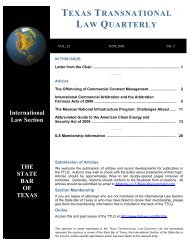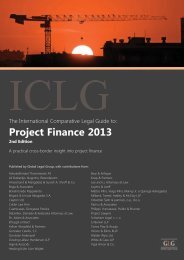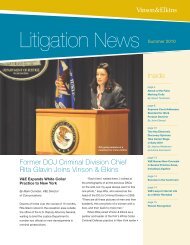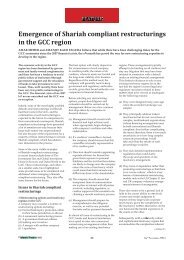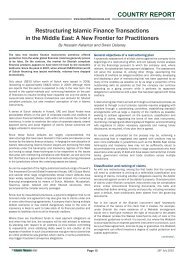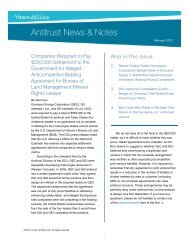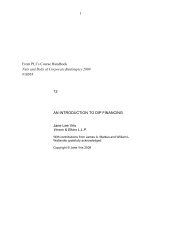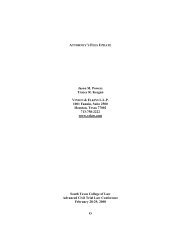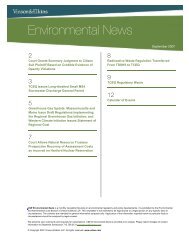Overview of U.S. Export Controls and Sanctions Issues Relating to ...
Overview of U.S. Export Controls and Sanctions Issues Relating to ...
Overview of U.S. Export Controls and Sanctions Issues Relating to ...
You also want an ePaper? Increase the reach of your titles
YUMPU automatically turns print PDFs into web optimized ePapers that Google loves.
is not possible <strong>to</strong> develop a reliable list <strong>of</strong> controlled products, s<strong>of</strong>tware <strong>and</strong> technology. The<br />
items identified above are simply intended <strong>to</strong> be illustrative, <strong>to</strong> identify some potential areas for<br />
further review <strong>and</strong> inquiry prior <strong>to</strong> export. Any company will need <strong>to</strong> perform a thorough review<br />
for export controls purposes <strong>of</strong> all products, s<strong>of</strong>tware <strong>and</strong> technology proposed for transfer <strong>to</strong><br />
PRC entities, <strong>to</strong> ensure that it is aware <strong>of</strong> the export jurisdiction (i.e., the ITAR or the EAR),<br />
classification (i.e., applicable ECCN, if any) <strong>and</strong> export license requirements <strong>of</strong> all items <strong>to</strong> be<br />
exported.<br />
If a license is required from the BIS, advance planning <strong>of</strong> at least six months or more is<br />
advisable. All license applications must be submitted electronically <strong>and</strong> a company must be<br />
registered with the BIS’s online application system in order <strong>to</strong> submit a license application.<br />
Additionally, license applications involving the PRC tend <strong>to</strong> be considered more sensitive <strong>and</strong><br />
involve a longer review period by the U.S. government. In addition <strong>to</strong> a review by Department <strong>of</strong><br />
Commerce <strong>and</strong> Department <strong>of</strong> Defense personnel, it is not uncommon for license applications<br />
involving the PRC <strong>to</strong> also be staffed <strong>to</strong> the Department <strong>of</strong> State for further review <strong>of</strong> potential<br />
national security <strong>and</strong> foreign policy considerations. While it is not likely that the export <strong>of</strong> any<br />
products, s<strong>of</strong>tware or technology would trigger the application <strong>of</strong> the “China Rule” described<br />
above, exporters would need <strong>to</strong> be prepared <strong>to</strong> show why the rule does not apply, as the U.S.<br />
government will consider the rule as part <strong>of</strong> the review <strong>of</strong> the license application.<br />
It is certainly possible that the development <strong>of</strong> EV technology could involve “publicly available”<br />
information that is not subject <strong>to</strong> the EAR or its licensing controls. However, as mentioned<br />
above, the publicly available designation is available in only limited situations. Moreover, by<br />
making information “publicly available,” exporters lose all proprietary protections, which is why,<br />
in most cases, exporters choose not <strong>to</strong> make information publicly available even if there is no<br />
regula<strong>to</strong>ry prohibition from doing so.<br />
Finally, it is possible that as part <strong>of</strong> initial EV development, companies will want <strong>to</strong> make use <strong>of</strong><br />
U.S. government funding, which could include funding made available by the U.S. Army, the<br />
Defense Advanced Research Projects Agency or other military entities. Companies should<br />
review such arrangements extremely carefully, <strong>to</strong> ensure they are not subjecting their products<br />
<strong>and</strong> technology <strong>to</strong> ITAR controls (which would, among other things, preclude the involvement <strong>of</strong><br />
the PRC <strong>and</strong> could severely restrict future sales opportunities).<br />
2. Compliance Considerations in Dealing with a Party Ineligible <strong>to</strong> Receive <strong>Export</strong>s<br />
As mentioned above, the U.S. restricts exports <strong>and</strong> re-exports <strong>to</strong> certain foreign <strong>and</strong> U.S.<br />
entities for national security <strong>and</strong> foreign policy reasons. Individuals <strong>and</strong> entities can end up<br />
being placed on the Denied Persons List, Unverified List, Entity List, Debarred List, or<br />
Nonproliferation <strong>Sanctions</strong> List. There are PRC entities included on the Entity List, SDN List,<br />
<strong>and</strong> Nonproliferation <strong>Sanctions</strong> List. These entities tend <strong>to</strong> be research organizations associated<br />
with the Chinese government, technology companies, <strong>and</strong> scientists. As a result, any EV<br />
developer or producer looking <strong>to</strong> engage in research <strong>and</strong> development activities involving the<br />
PRC should be especially careful that it does not end up doing business with an ineligible party,<br />
which will require screening all parties <strong>to</strong> the transaction against U.S. government lists <strong>of</strong><br />
ineligible parties. There is a particular risk when dealing with the PRC. Unlike European Union<br />
countries or other strong U.S. allies who are part <strong>of</strong> various multilateral regimes, <strong>and</strong> <strong>of</strong>ten<br />
impose similar export <strong>and</strong> re-export restrictions, the PRC does not recognize most export<br />
restrictions imposed by the U.S. As a result, a violation <strong>of</strong> U.S. export regulations would occur if<br />
a U.S. EV developer provided certain export controlled technology <strong>to</strong> a PRC company <strong>and</strong> the<br />
PRC company, in turn, provided the information <strong>to</strong> a research institution included on the Entity<br />
13







